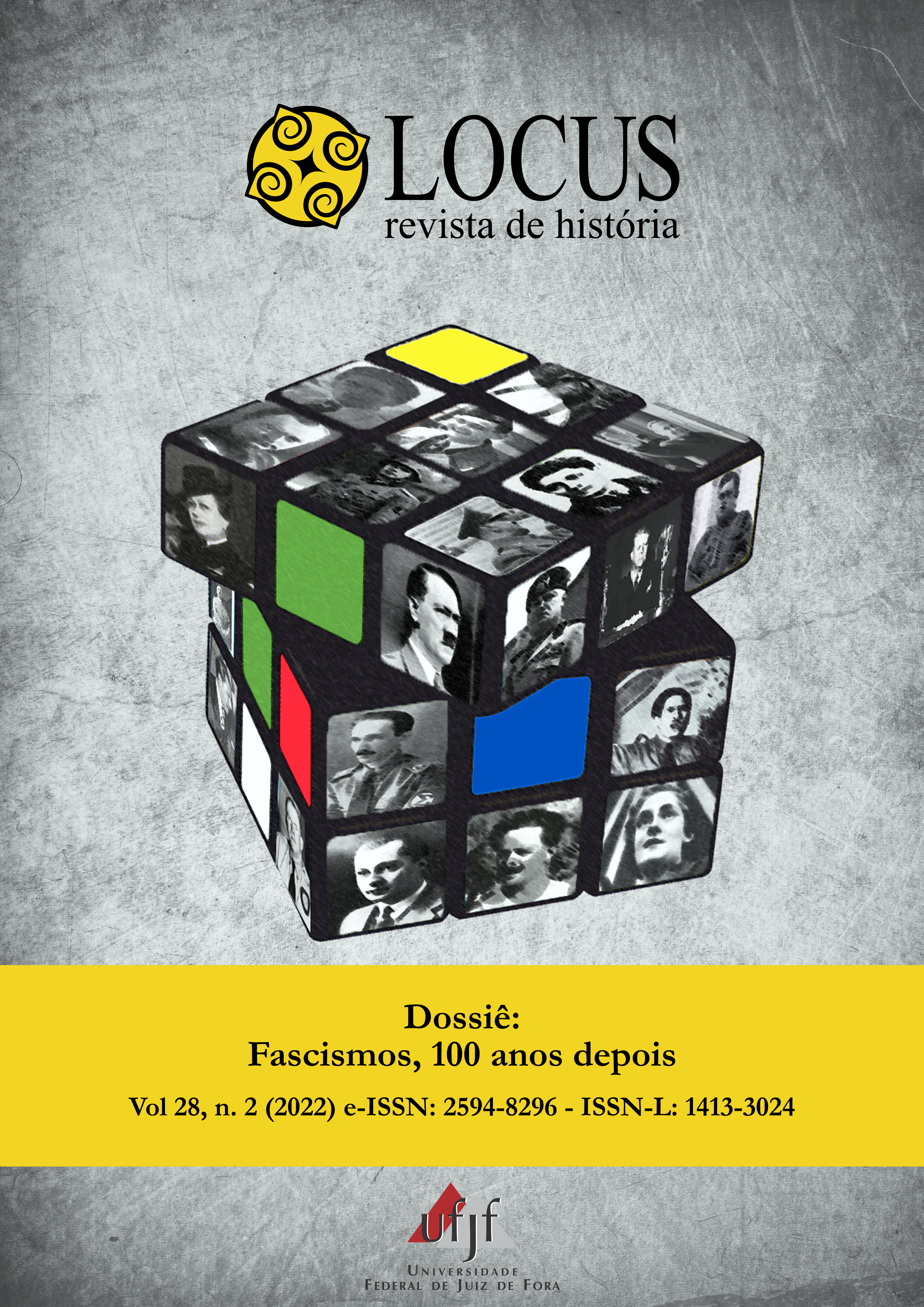Zarco Moniz Ferreira and the Portuguese radical right-wing between authoritarianism and democracy: a biographical approach
Published 2023-08-01
Keywords
- Portuguese Radical Right; Salazarism; Nationalism; Neofascism; Colonial war; Marcelo Caetano; Portuguese New State
How to Cite
Copyright (c) 2022 Riccardo Marchi, Tiago Pinto

This work is licensed under a Creative Commons Attribution 4.0 International License.
Abstract
In the 1960s and 1970s, Portugal witnessed a cycle of political radicalisation on the right and left, in the context of the crisis and fall of the authoritarian Salazarist regime, and the transition to democracy after the military coup of 1974. For the right wing, radicalisation was led by young university students inspired by the Portuguese nationalism of the first half of the 20th century, but also by foreign doctrines from the inter-war period, and by the neo-fascist subculture immediately after the second world war. This article explores the mobilisation of this radical subculture, with its links to the Estado Novo and the European far right, through a bibliographical appreciation of one of its best-known leaders, nationally and internationally: Zarco Moniz Ferreira. From his career as a political activist, between the end of authoritarianism and the democratic transition, a faithful picture emerges of the characteristics, dynamics, successes and failures of the mobilisation of the far-right in those troubled years of recent Portuguese history.
Downloads
References
- AA.VV. Nós Nunca seremos a geração da traição. 1º Congresso dos combatentes do Ultramar. Lisboa: Gratelo, 1974.
- Almada e Santos, Aurora. “A ONU e as resoluções da Assembleia Geral de Dezembro de 1960”. Relações Internacionais, 30 (2011): 61-69.
- Accornero, Guya. “Contentious politics and student dissent in the Twilight of the Portuguese dictatorship: analysis of a protest cycle”. Democratization, 20, nº6 (2013): 1036-1055. https://doi.org/10.1080/13510347.2012.674367
- Bale, Jeffrey McKenzie. The “Black” Terrorist International: Neo-fascist Paramilitary Networks and the “Strategy of Tension” in Italy, 1968-1974, Vol. 1. Berkeley: University of Berkeley, 1994.
- Barcellos, José de. “Congresso Constitutivo do Movimento Nacionalista do Progresso”, Frente - Mensário de Informação Cultura e Política, 6, Ano I, july 1966.
- Camus, Jean-Yves e Monzat, René. Les droites nationales et radicales en France: répertoire critique. Lyon: Presses universitaires de Lyon, 1992.
- Cerezales, Diego Palacios. “Civil resistance and democracy in the Portuguese revolution”. Journal of Contemporary History, 52, nº3 (2017): 688–709. https://doi.org/10.1177/0022009416641496
- Cerezales, Diego Palacios. “Fascist lackeys? Dealing with the police’s past during Portugal’s transition to democracy (1974–1980)”. Portuguese Journal of Social Science, 6, nº3 (2007): 155–169. https://doi.org/10.1386/pjss.6.3.155_1
- Cornejo, Marcela. “Political exile and the construction of identity: A life stories approach”, Journal of Community & Applied Social Psychology, 18 (2008): 333-348. https://doi.org/10.1002/casp.929
- Fafe, José Paulo. “Do “Jovem Portugal” à “Ordem Nova”: 20 Anos de Combate Fascista”, Expresso: A Revista, 5 february 1983.
- Fonseca, José Dias de Almeida da. O Livro Negro do 25 de Abril : Selecção de Tópicos Essenciais. Lisboa: Fernando Pereira, 1984.
- Jesus, José Manuel Duarte de. A Guerra secreta de Salazar em África. Alfragide: Dom Quixote, 2012.
- Krcmaric, Daniel, Nelson, Stephen C., Roberts, Andrew. “Studying Leaders and Elites: The Personal Biography Approach”. Annual Review of Political Science, 23 (2020): 133–151. https://doi.org/10.1146/annurev-polisci-050718-032801
- Lebourg, Nicolas. Les Nazis on-ils survécu? Paris: Seuil, 2019.
- Marchi, Riccardo. The Portuguese Far Right between late authoritarianism and democracy 1945-2015. London: Routledge, 2019. https://doi.org/10.4324/9781315409931
- Marchi, Riccardo. “A oposição de direita à política Ultramarina de Marcello Caetano”. Lusiada História, 2, nº7 (2010): 519-542.
- Marchi, Riccardo. Império Nação Revolução. As direitas radicais portuguesas no fim do Estado Novo (1959-1974). Alfragide: Texto, 2009.
- Picco, Pauline (2016a). Liaisons dangereuses. Les extremes droites en France et en Italie (1960-1984). Rennes: Presses Universitaires de Rennes, 2016a. https://doi.org/10.4000/books.pur.46731
- Pinto, Jaime Nogueira. Jogos Africanos. Lisboa: A Esfera dos Livros, 2008.
- Pinto, António Costa. “The radical right in contemporary Portugal”. In The Far Right in Western and Eastern Europe, eds. Luciano Cheles, Ronnie Ferguson and Michalina Vaughan, 108–128. London: Longman, 1995.
- Quintas, José Manuel. “O integralismo Lusitano para além das etiquetas”. In Ideias e percursos das direitas portuguesas, org. Riccardo Marchi, 167-195. Alfragide: Texto, 2014.
- Rosas, Fernando. “O Estado Novo”. In História de Portugal, Vol.VII, dir. José Mattoso. Lisboa: Círculo de Leitores, 1994.
- Santos, Pedro Marta. “A Extrema-Direita Portuguesa”, O Independente: Suplemento Vida, no. 447, 6 december 1996.
- Shamir, Boas, Dayan-Horesh, Hava and Adler, Dalya. “Leading by Biography: Towards a Life-story Approach to the Study of Leadership”. Leadership, 1, nº1 (2019): 13–29. https://doi.org/10.1177/1742715005049348
- Xiao, Jian. “The biographical approach in (post-) subcultural studies: Exploring punk in China”. European Journal of Cultural Studies, 20, nº6 (2017): 707-723. https://doi.org/10.1177/1367549417732999
- Zúquete, José Pedro. “Portugal: a new look at the extreme-right”. Representation, 43, nº3 (2007): 179-198. https://doi.org/10.1080/00344890701463654

